OD Ultra-Mel Het Cryptic Ball Python For Sale
$429.99
WE HAVE A 2021 MALE OD ULTRA-MEL HET CRYPTIC BALL PYTHON FOR SALE. HERE ARE SOME HIGHLIGHTS:
- Python regius
- Captive Bred Male
- Approximately 36 Inches In Length
- Roughly 760 Grams And Growing
- Adults Can Grow Up To 4 – 5 Feet
- Feeding On Live Rat Pups Weekly
FUN FACTS!
- A Great Beginner Pet!
- Ball Pythons Are Native To Central And Western Africa And Thrive In These Warm, Tropical Areas
- When Hatching Out Of The Egg They Can Be As Small As 10 Inches
- With Proper Care And Setup These Snakes Can Live 20 – 25+ Years In Captivity
OD Ultra-Mel Het Cryptic Ball Python
Ball Pythons: A Popular Choice for Reptile Enthusiasts
Ball pythons, scientifically known as Python regius, have long been a favored choice among reptile enthusiasts. Their widespread appeal is attributed to several key characteristics that make them ideal pets for both novice and seasoned reptile keepers. One of the most significant factors is their manageable size. Adult ball pythons typically range from three to five feet in length, which allows them to be housed comfortably in relatively small enclosures. This aspect alone makes them a practical option for individuals with limited space.
In addition to their convenient size, ball pythons are renowned for their docile nature. These snakes are generally calm and easy to handle, which is particularly advantageous for beginners who may be apprehensive about managing a more temperamental species. Their gentle demeanor ensures that handling and interacting with them is a stress-free experience for both the keeper and the snake.
Another compelling reason for the popularity of ball pythons is the incredible variety of morphs available. Morphs refer to the different genetic variations that result in unique patterns and colors. Ball pythons boast an extensive array of morphs, each more fascinating than the last. This diversity allows enthusiasts to choose a snake that matches their specific aesthetic preferences, adding a personalized touch to their reptile collection. The continuous breeding efforts within the reptile community ensure that new and exciting morphs are regularly introduced, keeping the interest in ball pythons ever-evolving.
Moreover, ball pythons are relatively low-maintenance compared to other reptile species. Their dietary needs are straightforward, primarily consisting of appropriately sized rodents, and they do not require overly complex environmental conditions. This simplicity in care further solidifies their status as a preferred choice for reptile enthusiasts.
Overall, the combination of manageable size, docile temperament, and the vast array of morphs makes ball pythons an excellent choice for reptile enthusiasts of all levels. Their captivating charm and ease of care continue to solidify their standing as one of the most beloved reptile pets globally.
Ball pythons, known for their diverse and captivating appearances, owe their unique looks to genetic variations called morphs. Morphs are the distinct colorations, patterns, and physical traits that differentiate one ball python from another. These genetic variations occur due to mutations in the DNA, which can be naturally occurring or selectively bred by enthusiasts and breeders.
In essence, a morph refers to the genetic makeup that influences the visible traits of a ball python. There are several types of morphs, each categorized based on their genetic characteristics. The primary categories include base morphs, designer morphs, and recessive morphs. Base morphs are single-gene variations that can produce visible changes in color or pattern. Examples include the Albino, Pastel, and Spider morphs.
Designer morphs, on the other hand, are the result of combining multiple base morphs. These combinations create unique and often striking visual effects. For instance, the OD Ultra-Mel Het Cryptic Ball Python is a designer morph that combines multiple genetic traits to produce its distinctive appearance. Recessive morphs require both parents to carry the gene for the trait to be expressed in the offspring. Examples of recessive morphs include the Piebald and Axanthic ball pythons.
The significance of breeding programs in producing unique ball pythons cannot be overstated. Breeders meticulously select and pair ball pythons with desirable traits to enhance or introduce new morphs. This careful selection process not only aims to produce visually stunning animals but also ensures the health and genetic diversity of the population. Advanced breeding techniques, such as genetic testing, are often employed to predict and achieve specific outcomes.
Understanding morphs and the science behind them enriches our appreciation for these fascinating creatures. The continuous exploration and discovery within the realm of ball python genetics promise an ever-evolving array of beautiful and diverse morphs, each contributing to the allure and complexity of the species.
OD Ultra-Mel Het Cryptic: A Unique Combination of Traits
The OD Ultra-Mel Het Cryptic ball python is an extraordinary blend of genetic traits, each contributing to its unique appearance and characteristics. Understanding these individual genes—Orange Dream (OD), Ultra-Mel, and Het Cryptic—sheds light on why this morph is highly sought after among reptile enthusiasts.
Orange Dream (OD) is a dominant gene known for its ability to enhance coloration in ball pythons. OD morphs typically exhibit more vivid and brighter oranges than their non-OD counterparts. This gene not only amplifies the base color but also sharpens the contrast between the patterns, creating a visually stunning snake.
Ultra-Mel, short for Ultramelanistic, is a recessive gene that significantly alters the pigmentation of the snake. Ultra-Mel ball pythons display a softer, almost caramel-like coloration with a semi-translucent quality. This gene reduces the dark pigmentation, giving the snake a more mellow and pastel appearance. When combined with the Orange Dream gene, the Ultra-Mel gene can transform a ball python into a radiant display of soft yet vibrant hues.
The Het Cryptic gene, short for heterozygous Cryptic, is a subtle but impactful addition to this morph. While the Het Cryptic gene does not always manifest visibly, it plays a crucial role in influencing the overall pattern and appearance of the snake. When expressed, Cryptic patterns can cause a breakdown in the usual ball python markings, resulting in an intricate and often unpredictable pattern.
The combination of these three genes produces a ball python that is not only visually striking but also genetically fascinating. The bright, enhanced colors of the Orange Dream gene, the softened and pastel-like tones of the Ultra-Mel gene, and the potential for unique pattern disruptions from the Het Cryptic gene collectively create a morph that stands out in any collection.
The OD Ultra-Mel Het Cryptic Ball Python is a remarkable example of genetic diversity within the species, showcasing the intricate interplay of various genetic mechanisms. To understand the genetics behind this unique morph, it’s essential to grasp basic genetic concepts such as dominant, co-dominant, and recessive genes.
Dominant Genes
Dominant genes are those that express their traits even when only one copy is present. In the case of the OD Ultra-Mel Het Cryptic Ball Python, the “OD” or Orange Dream gene is a dominant trait. This means that if a Ball Python carries even one copy of the Orange Dream gene, it will exhibit the characteristic vibrant coloration associated with this gene.
Co-Dominant Genes
Co-dominant genes are those where two different alleles are both expressed in the phenotype. For instance, the Ultra-Mel gene in Ball Pythons is a co-dominant trait. When a Ball Python inherits one Ultra-Mel allele and one normal allele, it will display a unique intermediate coloration. However, if it inherits two Ultra-Mel alleles, the intensity of the coloration increases, leading to the ultra-melanistic appearance.
Recessive Genes
Recessive genes require two copies to express their traits. The “Het Cryptic” gene is a recessive trait. A Ball Python must inherit two copies of the Cryptic gene to display the cryptic pattern. If only one copy is present, the gene is considered “heterozygous” and does not visibly affect the snake’s appearance but can be passed on to future generations.
When these genes combine, they create the OD Ultra-Mel Het Cryptic morph, a stunning example of genetic complexity. The interaction of the dominant Orange Dream gene with the co-dominant Ultra-Mel gene and the recessive Cryptic gene results in a Ball Python with a unique and visually striking appearance. Understanding these genetic mechanisms not only enhances our appreciation of this morph but also provides valuable insights into the broader field of genetics in reptiles.
Physical Appearance: What to Expect from an OD Ultra-Mel Het Cryptic
The OD Ultra-Mel Het Cryptic ball python is an extraordinary reptile, known for its striking physical characteristics that captivate both seasoned herpetologists and novice enthusiasts alike. One of the most notable features is its vivid coloration. The ‘OD’ in its name stands for ‘Orange Dream,’ a reference to the vibrant orange hues that adorn its body. These bright, fiery tones are complemented by the Ultra-Mel’s unique melanin-reducing trait, which results in a softer, almost pastel-like palette, creating a visually stunning contrast.
Another defining feature is the intricate patterning. Unlike typical ball pythons, the OD Ultra-Mel Het Cryptic displays a complex mosaic of irregular shapes and lines. The ‘Het Cryptic’ gene introduces a further layer of complexity, often resulting in a more disrupted and chaotic pattern that adds to its enigmatic beauty. The scales themselves are smooth and glossy, adding a sleek finish to the snake’s overall appearance.
In terms of size, the OD Ultra-Mel Het Cryptic ball python typically reaches an average length of 3 to 5 feet, similar to other ball python morphs. Their robust yet slender bodies are well-muscled, allowing for agile movement. The head is slightly wider than the neck, with large, expressive eyes that give the python a distinctive, almost personable look.
High-quality images often highlight these physical traits, showcasing the OD Ultra-Mel Het Cryptic in various stages of development. From hatchlings, with their more subdued coloration, to adults, whose colors have fully developed, each stage offers a unique glimpse into the morph’s transformation. These visual aids are invaluable for anyone looking to appreciate the full spectrum of beauty that this remarkable ball python possesses.
Care Requirements: Ensuring a Healthy and Happy Ball Python
Caring for an OD Ultra-Mel Het Cryptic ball python involves meticulous attention to housing, temperature, humidity, diet, and health monitoring to ensure your snake thrives in captivity. Proper housing is the cornerstone of their well-being. A secure, escape-proof enclosure is essential, with a minimum size of 40 gallons for an adult. Glass terrariums or plastic tubs are commonly used, each providing different advantages. The enclosure should be equipped with a secure lid and ventilation to maintain a clean environment.
Temperature regulation is critical for the OD Ultra-Mel Het Cryptic ball python. These reptiles require a thermal gradient within their enclosure, with a warm side ranging between 88-92°F and a cooler side around 78-82°F. Using under-tank heaters or ceramic heat emitters can help achieve these gradients. A digital thermometer and thermostat are indispensable tools to monitor and maintain consistent temperatures, preventing potential health issues caused by temperature fluctuations.
Humidity is another crucial factor. OD Ultra-Mel Het Cryptic ball pythons thrive in environments with 50-60% humidity. This can be achieved by misting the enclosure regularly and incorporating a water bowl large enough for the snake to soak. Proper humidity levels support healthy shedding and respiratory function. Hygrometers are useful for keeping track of humidity levels within the enclosure.
Dietary needs for this morph are similar to other ball pythons. They primarily feed on appropriately sized rodents, with juveniles requiring weekly feedings and adults needing food every 10-14 days. Providing fresh water at all times is imperative for hydration. Monitoring feeding habits is essential to detect any potential health concerns early.
Common health concerns for OD Ultra-Mel Het Cryptic ball pythons include respiratory infections, mites, and scale rot. Regular health checks and maintaining a clean enclosure can mitigate these risks. If any health issues arise, consulting a reptile veterinarian promptly is advisable.
By adhering to these care guidelines, you can ensure your OD Ultra-Mel Het Cryptic ball python remains healthy and content, providing you with years of companionship and fascination.
Breeding OD Ultra-Mel Het Cryptic Ball Pythons
The breeding of OD Ultra-Mel Het Cryptic Ball Pythons is a meticulous process that requires careful planning and execution. Pairing strategies are crucial for achieving desirable outcomes. Breeders often start by selecting a healthy, genetically diverse pair, ensuring that both the male and female exhibit vibrant coloration and strong genetic markers. The pairing of an Orange Dream (OD) Ultra-Mel with a Het Cryptic can produce offspring with a combination of these striking traits, resulting in visually stunning snakes.
During the breeding season, which typically spans from late winter to early spring, it is essential to monitor the health and behavior of the breeding pair closely. The female should be well-fed and in optimal health to ensure a successful clutch. Incubation practices also play a significant role in the breeding process. Once the female lays her eggs, they should be carefully placed in an incubator set at a consistent temperature, usually around 88-90 degrees Fahrenheit. Humidity levels should be maintained at approximately 90% to ensure proper development of the embryos.
Breeders can expect the incubation period to last around 55-60 days. During this time, it is vital to regularly check the eggs for any signs of mold or desiccation, addressing any issues promptly to avoid losing the clutch. The hatching process itself can be both thrilling and nerve-wracking, as breeders eagerly anticipate the emergence of the young pythons.
Despite the excitement, breeding OD Ultra-Mel Het Cryptic Ball Pythons does come with its challenges. Genetic variability can lead to unexpected outcomes, and not all pairings may result in the desired morphs. Additionally, ensuring the health of both the breeding pair and the offspring requires dedication and expertise. However, the rewards of successfully breeding these unique and captivating reptiles can be immensely satisfying, both from a personal and professional standpoint. Breeders who invest the time and effort into understanding the complexities of this process are often rewarded with healthy, vibrant snakes that are highly sought after in the reptile community.
Conclusion: The Allure of the OD Ultra-Mel Het Cryptic Ball Python
The OD Ultra-Mel Het Cryptic Ball Python stands as a testament to the extraordinary diversity within the reptile world. Its striking appearance, highlighted by the vivid orange dream (OD) coloration and the unique Ultra-Mel pattern, sets it apart from other morphs. This snake’s genetic makeup, enriched by the Het Cryptic gene, adds an additional layer of intrigue for breeders and enthusiasts alike.
Throughout our exploration, we have delved into the distinct characteristics that make this morph so captivating. The combination of its visual appeal and genetic potential creates a fascinating subject for both novice and experienced herpetologists. The OD Ultra-Mel Het Cryptic Ball Python not only offers aesthetic beauty but also presents exciting opportunities for breeding projects, promising new and unexpected outcomes.
Moreover, the allure of this particular ball python morph is not just in its appearance or genetic complexity but also in the passion it ignites within the reptile community. Collectors and breeders are continually fascinated by the potential to discover and create new morphs, pushing the boundaries of what is known and possible. The OD Ultra-Mel Het Cryptic Ball Python embodies this spirit of curiosity and innovation.
For those considering adding a unique and visually stunning snake to their collection, the OD Ultra-Mel Het Cryptic Ball Python is an excellent choice. Its rarity and the genetic possibilities it holds make it a valuable addition, not just as a pet, but as a vital part of ongoing reptile breeding and conservation efforts. As we continue to uncover the mysteries of this remarkable species, the OD Ultra-Mel Het Cryptic Ball Python undoubtedly will remain at the forefront of reptile enthusiasts’ interests.
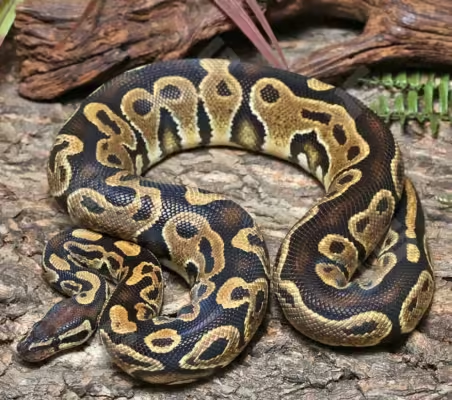


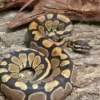
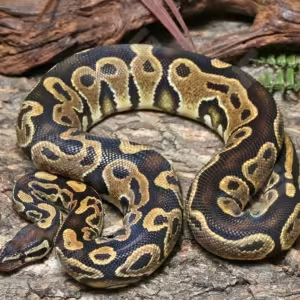






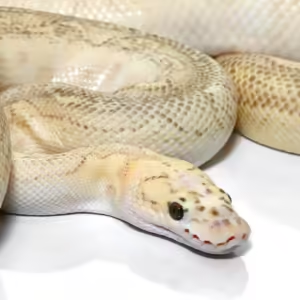



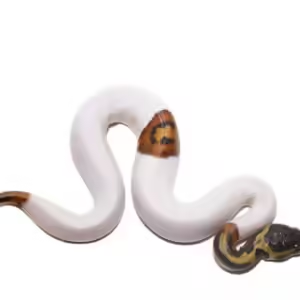
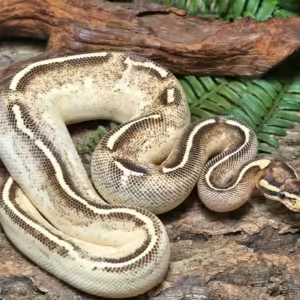


Reviews
There are no reviews yet.